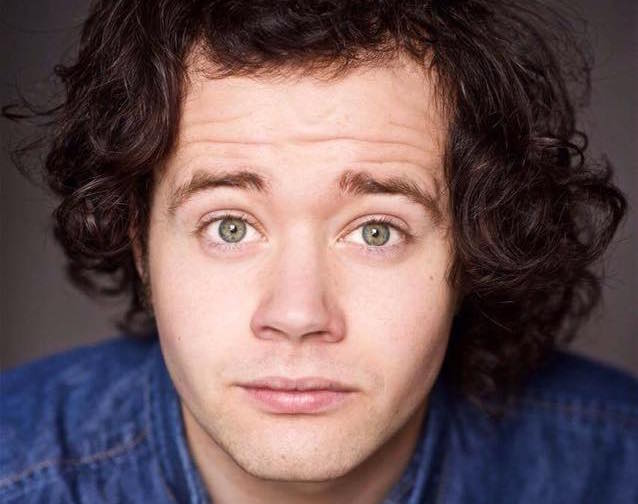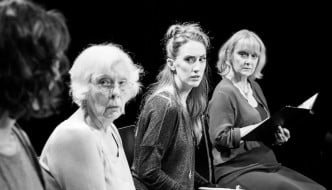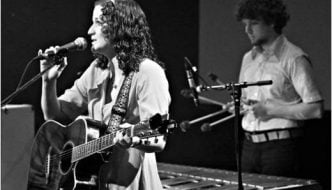
In July, TSOTA brought you the news that an all-new play is coming to Leeds! Amazing Grace has been written by local playwright, Leo Charlton, and this exciting world premiere is happening at Leeds Carriageworks Theatre in September. TSOTA gained access to an interview between Director Leo Charlton and leading man Will Charlton. Here’s the latest from the Amazing Grace team:
LC: By the time this play is over, you’ll have graduated from Arts Educational Schools London. What was that whole experience like for you?
WC: Surreal. Y’know, to think that for years attending drama school was very much in my ‘plan’ and that it’s been and gone – that three years have passed already – it sometimes takes a bit of getting used to. As for the experience itself, it was amazing. To be in London and to attend, in my personal opinion, the best drama school in the country at this moment in time was, yeah, incredible and I’m extremely fortunate to have been given the chance to go there and be a part of that school and to have their training behind me.
LC: What made you think ‘this is a project that I want to be a part of’, so soon after finishing your studies?
WC: Erm, to be honest I don’t think timing really came into it. I mean, y’know, this script has been in the works for over a year now and I wanted to be a part of it ever since I read the very first draft of it – when it was a one act play, so I think if anything it was just fortuitous that this is happening now because it’s given me the opportunity to be a part of it. If I was still in training, or if this was to happen a few months down the line, I might not have been able to join this project, so I think this has come at a good time for me personally. And especially, as you say, because I am a fresh graduate, I just wanted to get out there and into the industry and just do, y’know, do what I do. Do some acting.
LC: You’ve worked with the likes of Justin Audibert for a run of Table, and have been a member of the original cast for Jessica Swale’s The Mission. How has the process for Amazing Grace been different to what you’ve done before?
WC: It’s been quite a fair bit different to be honest. Obviously the main difference has been location; I haven’t done anything outside London for years so that’s been something new that I’ve had to embrace – a new city, new theatre… new accents! Then there’s obviously been the company – y’know, I’ve been working with a completely different company on this whereas beforehand I’ve been quite close to everyone; I’ve been friends with them prior so going into a play like Table where I was working with a lot of friends, it was almost made easier by knowing everyone really well even on the first day of rehearsals. The process as a whole for Amazing Grace has been different to anything I’ve worked on before. The time restraints especially have been very difficult to deal with but because of the script, and the ambition that not only I have for my character, but Leo had in writing the play as a whole, it’s been a big challenge and one I’ve been fully committed to overcoming and helping this play come to life and be, in my opinion, the fantastic piece of theatre I know it can be.
LC: Prior to Amazing Grace, what have been the best experiences you’ve had when being a part of dramatic projects?
WC: I mean, working with giants like Justin Audibert and Matthew Dunster are definitely among the best. Having creative discussions with those two and collaborating with them is just…yeah. It doesn’t really get better than that, I think.
LC: Is there anything that you are particularly proud of?
WC: Uhm I think I’m proud of most of the things I’ve been a part of. I’ve been very lucky to have worked on some great projects and with some very talented people. I think my favourite experience was when I performed on the West End for the first time. The feeling of standing on that stage and just taking everything in, and to act on it…it was unreal. I’ll never forget it.
LC: Let’s talk Lockwood. How much of yourself do you see in him? In fact, how much of Lockwood do you see in other people?
WC: I think there’s an incredible amount of Lockwood in everyone. That’s why I love this character; he’s a real guy. He’s got very real human complexities. And with the way this character is written; the rhythm of his speech (or lack of), both his ‘arrogance’ and his insecurities – they’re things that I think everyone has. Lockwood is a product or a victim of the world in which he lives and I think that rings very true to a lot of people, including me. In Lockwood’s first big monologue he talks about being ‘leads in our own stories’ as if life is a film that we’re the stars in, and I think a lot of people share that way of thinking and live their lives according to that. With things like Tinder, Snapchat, y’know, the whole ‘social media revolution’, it’s shaped how people live their lives now and it affects what they show to the rest of the world. We get that with Lockwood as well, but we also get to see deeper than that and see more than what Lockwood allows us to see, and I think that is what makes Lockwood such a gripping character to watch and for me to be with. You really see this human at his best and his worst, and I think that implores you as a spectator to feel any kind of emotion towards him, whether it’s disgust or sympathy.
LC: For you, what makes him such a compulsive character?
WC: I think it has to be his energy. He’s such a force, which I think he has to be in order for us to care about him, or even to be able to watch him for an hour and ten minutes. He’s outlandish and sometimes says things which make you sort of coil in disbelief and go ‘ohhh no, why have you said that?’ but then you don’t dislike him for it because not only does he pull it round by doing something else which is much more endearing, but I think he also has this charm whereby you sort of forgive his arrogance and his tastelessness because his charisma is quite warming.
LC: How much of a challenge has it been to get into Lockwood’s headspace?
WC: It’s varied from scene to scene to be honest. Right from the very beginning of the process, speaking to Leo about the character, we drew a lot of comparisons between Lockwood and myself and I think we do have some similar traits. So especially in the scenes where there’s more humour and things are a bit more playful, that was quite nice for me to tune into myself first and how I’d be in those situations and then bring a bit of that into Lockwood. But then obviously the script is very dense and a lot of themes that are addressed in the play, or events that Lockwood goes through are extremely challenging. So they’ve required a lot of research and knowledge, and they’ve obviously been very difficult to work on and to really immerse myself in. But what I think has made the process slightly easier is how both myself and Leo see Lockwood. I think we very much have the same vision, and because I’ve been a part of the process before we even had a first draft and obviously when you’re working with your brother as well, it makes things a bit easier because more often than not you’re on the same page.
LC: How has the experience been for you, and what do you think people who come to see this play will get out of it?
WC: It’s been exhausting. It has. We’ve had a lot of restrictions and because of our ambition with this play, and because we haven’t wanted to compromise – I mean, why would we? We want it to be the best it can be – it’s been very difficult to overcome those restrictions. I mean, we’ve had a lot of time restraints, which have made it an incredibly hard process. But we’ve just had to work around that, there was no cowering or hiding from the work, because we were putting this play on. This play was always going to happen, whether we had two weeks or five weeks. It meant that we just had to work hard, and make sure that we were constantly going at a hundred per cent, so it’s been very tiring, but it’s getting to that stage now where you just want people to see it.
I hope that when people see Amazing Grace they feel something. I think that’s all I can hope for really – that’s all I hope for when I’m going to watch a play. I just want to feel something and be moved. I don’t know what people will feel when they see this play, erm, it’s such a massive play that encompasses so many things; so many ideas and emotions that I still get learn something new and get something new every time I read the script again or we run it through. So I think I’d be happy if people came away and just felt one thing because I think it will stick with you. And I think people will remember this play, or at least I hope so. It’s unlike anything I’ve seen before.
LC: What do you plan to do after Amazing Grace is over?
WC: Ideally, Amazing Grace won’t be over. I’ve always said that I’d love this play to get picked up, and obviously wishful thinking as well would be that I would go with it. I want people to see this play, and I think people should see this play because as I say, it’s unlike anything I’ve seen or read before. So yeah, hopefully the journey that this play has been on, and the journey that I’ve had with it continues and we take as it far as it can go.
The production runs from 28 September 2016 to 01 October 2016. Get your tickets here.
Filed under: Theatre & Dance
Tagged with: Amazing Grace, Carriageworks theatre, interview, leeds, Leeds Arts Centre, Leo Charlton, Will Charlton, yorkshire


Comments